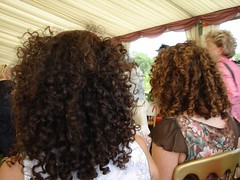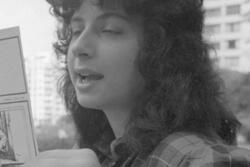What is Jewish hair?
 Photo: "Great Jewish Hair" by Sashinka-uk
Photo: "Great Jewish Hair" by Sashinka-ukFor more about Jewish Hair, check out Episode 5: "Jewish Hair" of Can We Talk, JWA's podcast.
The buzz about Good Hair, Chris Rock's new documentary about Black hair, has got me thinking about "Jewish hair": what it is, what it means, and where I -- a straight-haired woman -- fit into this curious piece of Jewish identity.
"Jewish hair" is a tricky thing to define, since Judaism can include people from any racial or ethnic background. And while Jews are known to have a variety of haircolors, as well as levels of curliness, "Jewish hair" seems to refer to dark, curly, and often frizzy, hair.
The first time I became aware of “Jewish hair” was when I went to an overnight for prospective students at Brandeis University. Up until that moment, sitting in a crowded upperclassmen dorm, I had never really thought about my hair as a part of my Jewish identity. But as I looked around the room, a sea of dark curls, I couldn’t help but notice that I was one of the few people with straight hair. With my light eyes and straight, brown hair, I found myself wondering if I "looked Jewish." And even more troubling, did I want to "look Jewish?"
The introduction of Rebecca Rubin, the Jewish American Girl Doll, sparked conversation about this question a few months ago. Some were upset that the doll looked "stereotypically Jewish," while others thought she didn't "look Jewish" enough. Like many minorities, we are stuck between the desire to celebrate our ethnicism and embrace our diversity as a community.
While the politics of Black hair and Jewish hair are not comparable, it is safe to say that many Jewish women have felt the pressure to look like the mainstream images we see in magazines. This reinforces the idea that one must look "white" to look beautiful. Judith Rosenbaum touched on this in her post about Patrick Swayze, and what it meant for frizzy-haired Jennifer Grey to be the object of his sexual desire in Dirty Dancing. Many curly-haired Jewish girls straighten their hair, and some use chemical treatments for more permanent results. I think the only time I have ever seen my older cousin's naturally curly hair was in her Bat Mitzvah photos from 1988.
The "Jewish hair" issue is also gendered. Curiously, or perhaps not, it seems only Jewish women straighten their hair. Jewish men with "Jewish hair" can choose to keep it cropped short, or let it grow into a "Jew-fro," which has been recently popularized by Jewish comedy stars like Seth Rogen and Jonah Hill. Thanks to those high profile Jews, the Jew-fro has become the mark of the "funny guy" who gets laughs making fun of himself and his Jewish heritage. The Jew-fro's resurgance has done little to challenge stereotypes of Jewish masculinity. We may see a Jew-fro on an action hero someday, but I'm not holding my breath.
This is particularly interesting when you consider that the Jew-fro was first considered a "style" in the 60s and 70s, when the Afro was worn as a mark of ethnic pride, and was sported by Jewish folk icons like Bob Dylon and Art Garfunkel. Was the Jew-fro meant to be a mark of solidarity with the Black community during the Civil Rights and Black Power movements, or was it merely a fashion statement? And why do Black women participate in the Afro, while Jewish women with big, curly hair do not usually appropriate the term "Jew-fro" to describe their 'do? The fact that we find ourselves thinking about "Jewish hair" within the context of "Black hair" suggests that Jews strongly identify with the Black community when it comes to the issues surrounding "looking ethnic" in America.
I cannot speak for curly-haired Jewish women, since I have had a different experience with my "Jewish hair," if you can even call it that. (We not only must define our own identity, we must define our hair's identity!) For this reason, I would love to hear some stories from women with different hair and different experiences. What's your Jewish hair identity?
Visit our Flickr group "My Jewish Hair," and share a photo of your great, Jewish hair!







...and have no clue about my heritage. My hair fits in with "jewish hair" though so you have me wondering. Interesting thoughts.
I'm Christian and as far as I know, I don't have a Jewish heritage, but I definitely have Jewish hair! It's naturally dark brown, curly, thick and frizzy. I used to pull it back into a ponytail to hide the frizziness, recently I've learned how to get it tame enough to be worn down, although I'm still paranoid of a frizz attack when its down.
It wasn't until I started college that I embraced my curls. While I straighten my hair occasionally, I have learned how to make the most of my curls.
I'm 54 years old and STILL uncomfortable wearing my hair in its wild naturally curly state, even though my husband says he likes it better that way. I yearn for the return of the eighties "Flashdance", disco hair. Before I die, I'm gonna accept myself just as I am, fashion. Be damned.
i am an african-american woman and it is comforting to see that jewish-american women also feel the same kind of pressure to "fit in". i have always thought curly hair was so pretty no matter whose head it was growing out of--except, of course, my own. after 25 long years I have opted to end my relationship with chemical relaxers, and letting my natural curls take reign. as a side note, i believe seth rogen is irish or part irish (rogen is an irish surname). reading this article made me think of natalie portman a jewish-american who openly admitted her dislike of her "crazy curly hair" and says she keeps it straightened. i think the only real glimpse she has given of her natural hair (that I know of) was in star wars: attack of the clones. there is a scene early in the film where she is wearing a funky, trophy cup headress and just the front of her unstraightened hair is exposed.
I am not jewish, i am black and mixed with other races, and i think it's wonderful. Celebrate your beauty my jewish sisters, this is what makes the world beautiful place, diversity. love who you are!
I come from a non-practicing Russian jewish family. My mother's maiden name was anglicized from Brokovitz to Brook. I grew up without a notion of jewishness. But, I was different. A picture of me shows a young girl, perhaps three years old, with an afro halo three feet above her. I grew up in Seattle, a mostly segregated city, during the 80's and 90's. African-Americans thought I was mixed. When asked to touch upon my racial background, I would shyly admit to being "jewish" not having any idea of the sacraments and duties, but to hint at my "ethnicity." I was "jewish." My mother, not wanting to take the time to fix or mess with it, made me stick to an afro. Oy, how I hated this. I was teased relentlessly. Some felt that it would be fine to try to see if a ball would bounce off my head-real funny. I finally relaxed my hair after again growing it out three feet above my head. It was a disaster- it looked like fried bacon strips. Again, I grew it out, and wore it proudly, purple, for my graduation. It continued to grow, and finally I wore it back, tied down. (always a few frizzy strands escaping) Today, after having again, gone through the relaxation process, I cut off my relaxed hair to once again wear my jewfro halo. A few relaxed strips create an interesting touch to my frizzy fro.It is my "ethnicity of jewishness" the only, granted tangible thing, I can identify to a culture.
Wait, I'm blond and have grey-green eyes with a black ring around the iris. When I saw Rebecca, I was so happy that a doll meant to represent my ethnicity actually looked like me, right down to the eyes, which family tradition claims came down straight from my great great grandmother. Do you mean to say I'm less Jewish because of my fair skin and wavy blond hair?
Your film made me uncomfortable. It seemed destined to make the viwer hostile to the Koreans. Why not take a look at how the Koreans became so successful. What is it that the black community did not do? Were there illegal business practices or are the Koreans better business persons? I don't know the answers here.
In reply to <p>Your film made me by Anonymous
There were many very successful black people that started the ethnic beauty business. Read about Madame CHILDREN Walker.Johnson products.Lawrence Blankenship of Kansas City Mo. They started the industry. Many of their children did not continue the business. Many blacks chose better jobs.I would not be talking down to black people. They are your Customers.
Please take a moment to check out my documentary film BLACK HAIR
It is free at youtube. 6 parts including an update from London, England.
It explores the Korean Take-over of the Black Beauty Supply and Hair biz..
The current situation makes it hard to believe that Madame C.J. Walker once ran the whole thing.
I am not a hater, I am a motivator.
Plus I am a White guy who stumbled upon this, and felt it was so wrong I had to make a film about it.
self-funded film, made from the heart.
Can it be taken back?
Link http://www.youtube.com/watch?v...
I didn't realize I had curly hair until 1964, when the Beatles arrived in the U.S. Then it became an embarrassment. I wore a hat the entire summer of '66, at the end of which my parents allowed me to get my hair straightened at a beauty shop because I really wanted to enter junior high with straight hair. After the ordeal, I dashed into the house, asking Mom, "How does it look?" She paused. For a long time. I'll never forget the words: "It looks the same." I ran to the bathroom mirror, stunned to see that in the 10 minutes it had taken to go from beauty shop to home, it had all "turned."
For years thereafter I slept with large rollers in my hair. But when I discovered my inner hippie, I let my freak flag fly into long ringlets. By the summer of '70, my younger sister and I couldn't go anywhere without someone asking us, "How do you get your hair to do that?" Years later everyone assumed we had "permed" hair.
To this day I wear it curly and occasionally wind-blown wild. Proud of my Jewish hair.
my hair is so curly and my skin is such a deep olive color, that people often mistake me for bi-racial. Because of this, I have always related very strongly to the black community. When it comes to looks, I feel like an outsider to the white world. However, I am Jewsh and was raised in a Jewish home by two Jewish parents. I tried straightening my hair once with a blow dryer. It looked like dry stiff straw. I decided tight curls were beautiful and went with it. It wasn't a proclamation of my Jewish identity, but simply the most attractive and practicle hair style for me.
Jewish hair has a beauty all it own. Think Amy Irving in Crossing Delancy or Carol Kane in Hester St. or the actress (from Brandeis) in Will and Grace. I side with those that feel that Rebecca Rubin got sold out.
When I was a young girl in the 1960s, long hair -- the straighter the better -- was the must-have look for white girls. There was no layering of hair, either. Layered cutting didn't happen until the early 70s. My hair was wavy rather than curly, but very frizzy. This was before hand-held blow dryers and styling products. We had lacquer hairspray and instruments of torture like curlers and juice cans. Sleeping on rollers was an experience I'll never forget. When Dippity-Do was invented in the mid-60s it was a revelation.I lived 50 miles outside of New York City, in a school district where there were very few Jewish families. When I was in the 5th grade, in 1965, it was the vogue to pass around autograph books at the end of the school year for other girls to sign. There were popular rhymes girls would write to each other, often "slams". One such rhyme was "When you are old and gaining weight, remember the girdles are $5.98." Common enough. Except that in my book, the writer added an asterisk and wrote "And the brushes are $1.00." In other words, it looked to my classmates like I never brushed my hair. I felt utterly humiliated. Just to add a comment about the article above: some women did wear the Jewfro, briefly, in the 1970s. I remember Rhea Perlman of Cheers fame wore it for a season or two. I don't think it lasted long, though, possibly because we knew how much Jewish men yearned to date non-Jewish women who had that long, flowy, silky hair.
Growing up, I always wanted a Jewfro like Abby Hoffman had. Not a recent thing, at all.
Reading about Chris Rock's new film, I also reflected on my experience of having "Jewish hair". I have very wavy hair, and growing up in the 60s and 70s, I was very aware that I didn't look like most of my Catholic neighbors or like the idols or models of the time, including Farrah Fawcett. I spent a lot of time and energy trying to straighten my hair. Luckily, as I grew older, I learned to work with my hair, and now I have a hairstyle that suits the curliness. Also, I feel there isn't as much stigma attached to curly or "Jewish" hair these days. But it still is an issue - if you look on reality TV, most young women considered "hot" have straight, long hair - never going to be a reality to someone like me.